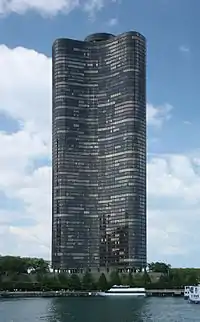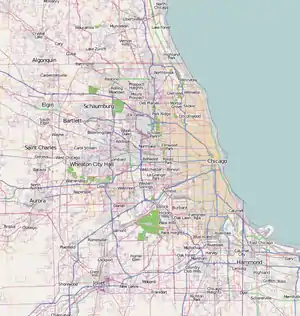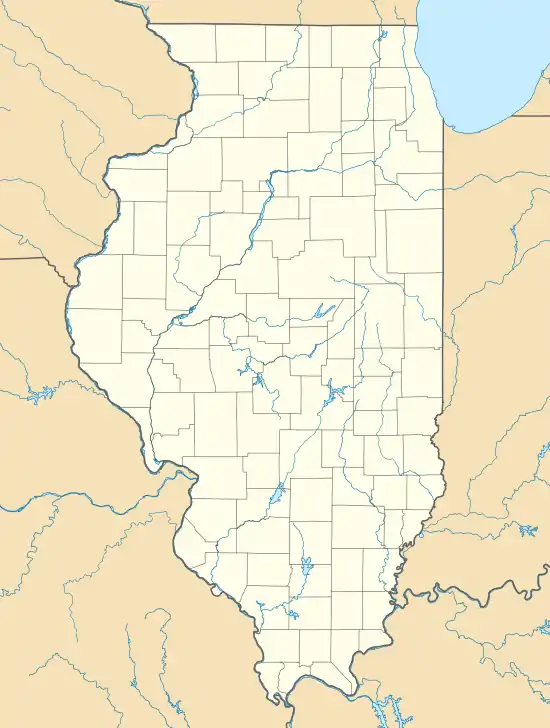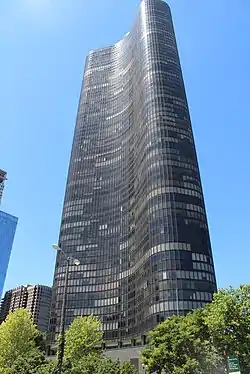Lake Point Tower
Lake Point Tower is a high-rise residential building located on a promontory of the Lake Michigan waterfront in Chicago, just north of the Chicago River at 505 North Lake Shore Drive. Completed in 1968, it is in the Streeterville neighborhood on the Near North Side. Located adjacent to Navy Pier, the building is the only skyscraper that sits east of Lake Shore Drive in the city.
| Lake Point Tower | |
|---|---|
 | |
 Location within Chicago metropolitan area  Lake Point Tower (Illinois)  Lake Point Tower (the United States) | |
| General information | |
| Location | Chicago, Illinois, United States |
| Coordinates | 41°53′30″N 87°36′44″W |
| Construction started | 1965 |
| Completed | 1968 |
| Height | |
| Roof | 645 ft (197 m) |
| Technical details | |
| Floor count | 70 |
| Floor area | 1,299,990 sq ft (120,773 m2) |
| References | |
| [1] | |
Its tall curved three wing 'Y' shape was an inspiration for the Burj Khalifa tower in Dubai, United Arab Emirates by Chicago-born architect Adrian Smith.[2]
Development
The architects for Lake Point Tower were John Heinrich and George Schipporeit, working under the firm name of Schipporeit and Heinrich; the two were students of Ludwig Mies van der Rohe, one of the best known architects of the Bauhaus movement and International Style school, who taught at the Illinois Institute of Technology in Chicago. Lake Point Tower was completed in 1968, is approximately 645 feet (197 m) tall, and was the tallest apartment building in the world at that time. The project developer was William F. Hartnett, Jr., chairman and founder of Hartnett-Shaw Development Company, which was responsible for more than 260 residential and commercial real estate developments in the United States from 1961–1983.
Architecture
Lake Point Tower was inspired by Mies van der Rohe’s 1922 design for a glass-curtained skyscraper in Berlin.[3] Schipporeit and Heinrich took van der Rohe's unbuilt office building concept and converted it to a residential building. Despite differences — Lake Point Tower is much taller than van der Rohe’s original project, more regular in form, and its exterior glass curtain wall is tinted — many consider it a Mies van der Rohe building executed by two of his protégés.
Because of its height and lakeside site, the skyscraper had to be designed to withstand high winds. At the center of the building is a triangular core, 59 feet wide, that contains nine elevators and three stairwells. This core holds all of the vertical weight of the building, allowing the perimeter columns on the facade to be much smaller.
Radiating from the core are three arms that form an asymmetrical Y-shaped floor plan. The original four-armed design was changed to a three-armed design (120° apart). The outer walls are curved to prevent residents from seeing into other condominiums.[4] The façade of the building is a curtain of bronze-tinted glass framed by gold-anodized aluminum, which reflects the sunlight off of Lake Michigan and looks golden.[5]
Other features

Well known for its graceful curves and enviable location, Lake Point Tower is the only major private structure on the east side of Lake Shore Drive and likely to remain that way for the foreseeable future, given the city's rare occasions of building large structures on the east side of Lake Shore Drive.
At the top of the building, on its 70th floor, is the upscale restaurant Cité.[6]
Lake Point Tower was one of the first high-rise residential buildings in the world to feature all-electric appliances and utilities and pioneered the concept of the "Park in the City," being the first residential complex in a major city to have its own two-and-one-half acre park—including a playground, pool, duck pond, and waterfalls — three stories above ground. The building also features an assortment of shops and restaurants on the second and ground levels of the complex, under the third-floor park.
Lake Point Tower's position between Lake Shore Drive and Navy Pier gives it unimpeded views in all directions that are protected, for the foreseeable future, by ordinances controlling the use of construction exactly on the city's waterfront.
Movies shot on location
Lake Point Tower has been host to many film shoots including:
- Raw Deal, (1986)
- Folks!, (1991)
- Straight Talk, (1992) This film featured Dolly Parton and James Woods, and had Parton's character living in Lake Point Tower.
- While You Were Sleeping, (1995) Parts of this film, starring Sandra Bullock and Peter Gallagher, were shot in Lake Point Tower.
- Meet the Parents, (2000)
- Category 6: Day of Destruction, (2004) In an outtake of this film, it is destroyed by a tornado in news footage.
- The Lake House, (2006) Hospital reception area filmed in Lake Point Tower's lobby.
- Divergent (2014) Briefly shown abandoned and decayed in a future Chicago. Huge Lake Michigan is shown to have transformed into a wetland in the same shot.
Famous residents
Lake Point Tower has been home to many affluent Chicagoans past and present, including:
- David Axelrod, Political Consultant
- Ryne Sandberg, former Chicago Cubs player
- Sammy Sosa, formerly of the Chicago Cubs baseball team
- Alice Cooper, rock singer, songwriter and musician
- Ozzie Guillén, Chicago White Sox former player, manager
- Andre Dawson, former Chicago Cubs outfielder
- Scottie Pippen, former Chicago Bulls player
- Goldie Hawn, actress
- Kurt Russell, actor
- Rich (Goose) Gossage, former Chicago White Sox pitcher
- Mickey Rooney, film and stage actor
- Joakim Noah, former Chicago Bulls Center
- B.J. Armstrong, former Chicago Bulls player
- Helen Reddy, singer of "I am Woman; Hear Me Roar"
- Vince Evans, former Chicago Bears quarterback
Position in Chicago's skyline

See also
| Wikimedia Commons has media related to Lake Point Tower (Chicago, Illinois). |
- Chicago architecture
- List of buildings
- List of skyscrapers
- List of tallest buildings in Chicago
- List of tallest buildings in the United States
- World's tallest structures
- Harbor Point (skyscraper)
- Park Tower Condominium (Chicago)
References
- Lake Point Tower at Emporis
- Kamin, Blair. "50 years later, Lake Point Tower is a singular achievement — and let's hope it stays that way". chicagotribune.com. Retrieved 2018-09-23.
- Heise, Kenan (January 22, 1993). "John Heinrich, Architect for Lake Point Tower". Chicago Tribune. Retrieved 6 June 2018.
- Lepik, Andres (2005). Skyscrapers. Munich: Prestel. pp. 84–87.
- Blaser, Werner (1981). Mies van der Rohe: Continuing the Chicago School of Architecture. Basel: Birkhauser Verlag. pp. 224–27.
- "Cité Chicago". www.citechicago.com. Cité Chicago. n.d. Retrieved August 20, 2017.
Further reading
- Schulze, Franz; Kevin Harrington (2003). Chicago's Famous Buildings. Chicago, IL: University of Chicago Press. p. 157.
- Sinkevitch, Alice (1993). AIA Guide to Chicago. Orlando, FL: Harcourt Brace & Company. pp. 117–18.
- Windhorst, Edward; Kevin Harrington (2009). Lake Point Tower: A Design History. Chicago Architecture Foundation. ASIN B003MTAHV8.
- Skyscrapers, Antonino Terranova, White Star Publishers, 2003 (ISBN 8880952307)
- In 2007, the American Institute of Architects listed Lake Point Tower as one of America's 150 favorite structures.